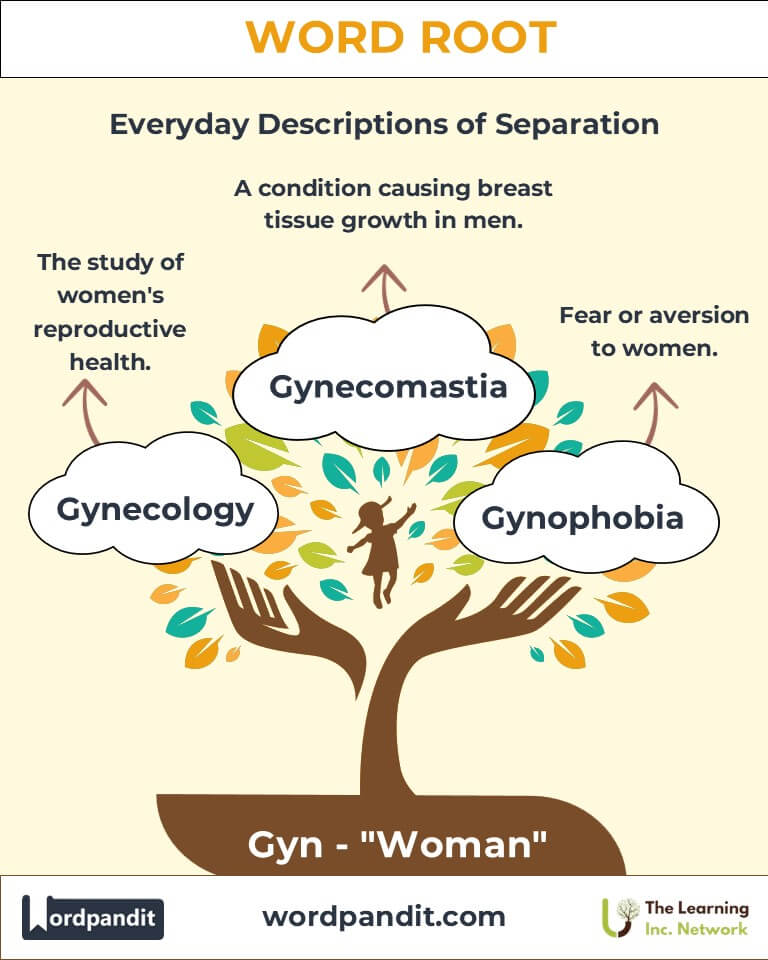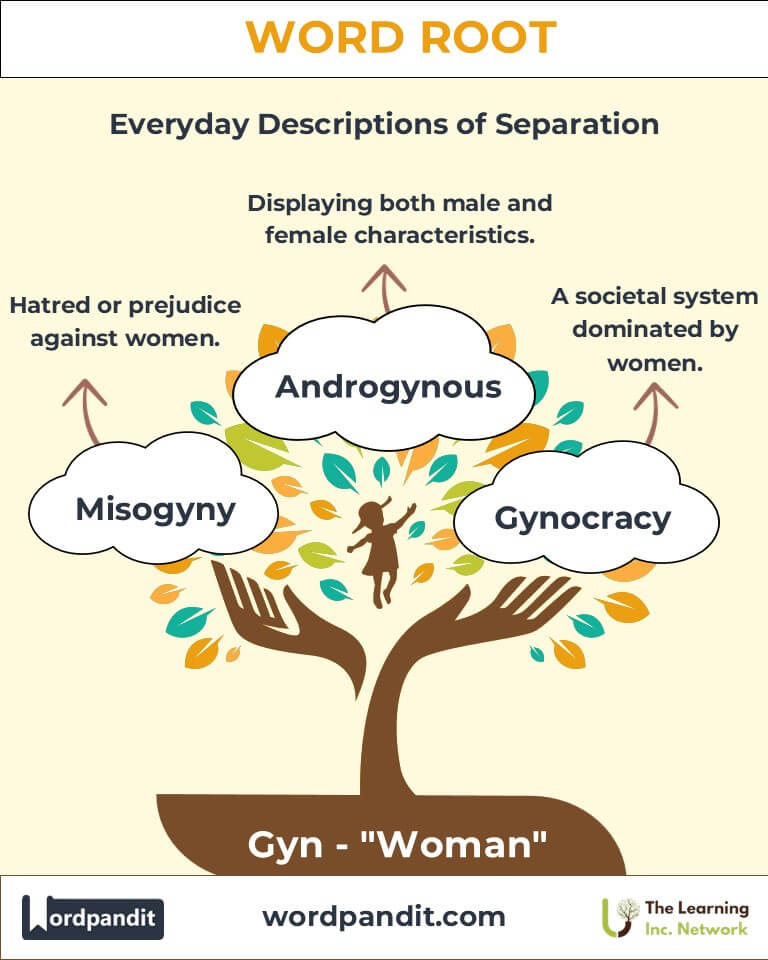Gyn: The Feminine Foundation of Words and Wisdom
Explore the root "gyn," derived from the Greek word "gyne" meaning "woman" or "female." From the science of gynecology to the darker implications of misogyny, this root provides a linguistic lens into our understanding of women, gender, and societal roles.

Table of Contents
- Introduction: The Essence of "Gyn"
- Etymology and Historical Journey
- Mnemonic: Unlocking the Power of "Gyn"
- Common Gyn-Related Terms
- Gyn Through Time
- Gyn in Specialized Fields
- Illustrative Story: Gyn in Action
- Cultural Significance of the Gyn Root
- The Gyn Family Tree
- FAQs about the Gyn Word Root
- Test Your Knowledge: Gyn Mastery Quiz
- Conclusion: The Living Legacy of "Gyn"
1. Introduction: The Essence of "Gyn"
What does it mean to embody the feminine in language? The root "gyn," pronounced "jin" (as in "begin"), originates from Greek and represents "woman" or "female." It forms the basis of words that delve into gender, healthcare, and societal dynamics. From scientific fields like gynecology to terms addressing gender-based discrimination like misogyny, this root highlights both the celebration and challenges of femininity in society.

2. Etymology and Historical Journey
The root "gyn" comes from the ancient Greek word gyne (woman). It has been central to terms describing women’s health, gender roles, and societal perceptions since antiquity. In classical Greece, words like "gynaikon" referred to women's quarters, indicating how language and architecture intersected with gender roles. Over centuries, "gyn" entered scientific lexicons and societal discourse, reflecting evolving understandings of gender.
3. Mnemonic: Unlocking the Power of "Gyn"
Mnemonic Device: "Gyn represents the strength and essence of women in science, society, and beyond."
To remember the root "gyn," visualize a gynecologist examining a symbol of the female form, such as a Venus statue, while addressing women’s healthcare. Alternatively, think of a woman proudly holding the word "gyn" as a banner for empowerment and identity.
4. Common Gyn-Related Terms
- Gynecology (jin-eh-KOL-uh-jee)
- Definition: The medical field specializing in women's reproductive health.
- Example: "Dr. Taylor’s expertise in gynecology saved countless lives through early cancer detection."
- Misogyny (mih-SOJ-uh-nee)
- Definition: Hatred, dislike, or prejudice against women.
- Example: "Addressing misogyny is essential for creating a fair and equitable society."
- Androgynous (an-DROJ-uh-nuhs)
- Definition: Displaying both male and female characteristics.
- Example: "Their androgynous fashion blurred traditional gender norms."
5. Gyn Through Time
- Gynecia (Ancient): Referring to women’s spaces in Greek households, the term embodied gendered divisions in classical architecture.
- Misogyny (Medieval): The concept was codified in texts like "Malleus Maleficarum," which demonized women during witch hunts.
- Gynecology (Modern): Emerging as a medical specialty in the 19th century, it revolutionized women’s healthcare, though its history is intertwined with ethical controversies.
6. Illustrative Story: Gyn in Action
Sophia, a young doctor specializing in gynecology, faced a challenging case—a pregnant woman with a rare condition threatening both mother and child. Drawing on her expertise, Sophia collaborated with specialists to devise a life-saving procedure. Meanwhile, Sophia also volunteered to teach workshops addressing misogyny in healthcare, ensuring her patients not only received medical care but also empathy and respect. Her journey exemplified the transformative power of "gyn" in science and society.
7. Cultural Significance of the Gyn Root
The root "gyn" has profound cultural relevance. Ancient myths like those of the Amazons depicted women in positions of power, while modern feminism uses the term misogyny to critique systemic sexism. From healthcare to activism, "gyn" underscores ongoing conversations about gender, equity, and identity.
8. Gyn in Specialized Fields
- Medicine:
- Gynecology: Focuses on female reproductive systems, addressing issues like menstruation, fertility, and menopause.
- Sociology:
- Gynophobia: Fear or aversion to women, reflecting societal biases.
- Architecture:
- Gynaikonitis: Women's quarters in ancient Greek homes, symbolizing gendered spaces.
- Literature:
- Misogyny: Often explored in feminist critique, revealing systemic biases in cultural narratives.

9. The Gyn Family Tree
- Andro- (man):
- Androgyny: Blending male and female characteristics.
- Mis- (hate):
- Misogyny: Hatred of women.
- Bio- (life):
- Gynecology: The study of women’s reproductive health.

10. FAQs About the "Gyn" Word Root
1. What does the root "gyn" mean?
The root "gyn" originates from the Greek word gyne, which means "woman" or "female." It forms the basis of words related to women, femininity, or gender-specific aspects in language, science, and society.
2. Why is "gyn" important in medicine?
The root "gyn" is central to gynecology, the medical field focusing on the health of the female reproductive system. This discipline addresses crucial aspects of women’s health, such as fertility, pregnancy, menstrual disorders, and menopause, and has improved healthcare outcomes for women globally.
3. What is the difference between "gyn" and "andro"?
The root "gyn" refers specifically to women, while "andro" comes from the Greek word aner, meaning "man." These roots often appear together in terms like androgyny (displaying characteristics of both genders) and in medical fields like andrology, which focuses on male reproductive health.
4. What is the significance of misogyny in language and culture?
Misogyny, derived from "mis-" (hatred) and "gyn" (woman), refers to prejudice, hatred, or contempt for women. Historically, it has shaped societal structures, literature, and laws, often reflecting systemic biases. Modern feminist movements aim to dismantle misogyny and promote gender equity.
5. Are there positive uses of the root "gyn"?
Absolutely! Words like gynarchy (a society governed by women) or gynecology highlight the strength, importance, and care associated with femininity. These terms remind us of the contributions and roles women have played across history and disciplines.
6. What does androgynous mean?
Androgynous combines "andro" (man) and "gyn" (woman) to describe someone who exhibits characteristics traditionally associated with both genders. This term is commonly used in fashion, art, and discussions of gender identity to highlight fluidity or a blending of traits.
7. How has "gyn" shaped modern vocabulary?
The root has influenced terms in fields like sociology (e.g., gynophobia, the fear of women), medicine (e.g., gynecology, focused on women’s health), and politics (e.g., gynocracy, rule by women). Its versatility reflects evolving attitudes toward gender roles and women’s empowerment.
8. Is "gyn" ever used to describe men?
While "gyn" primarily relates to women, it appears in contexts like gynecomastia, a condition in men involving the growth of breast tissue. This usage reflects a medical condition rather than a direct association with femininity.
9. What is gynophobia, and how does it differ from misogyny?
Gynophobia is the irrational fear or aversion to women, often rooted in psychological or cultural influences. Misogyny, on the other hand, involves active dislike or prejudice against women. While related, gynophobia reflects fear, while misogyny reflects hostility.
10. Why does the root "gyn" remain relevant today?
The root "gyn" remains central in discussions about gender, healthcare, and social equity. It forms the basis for analyzing systemic issues like misogyny and advocating for advancements in women’s rights and health through fields like gynecology.
11. Test Your Knowledge: "Gyn" Mastery Quiz
1. What does the root "gyn" signify?
2. Which field specializes in female reproductive health?
3. What does misogyny mean?
4. What does androgynous describe?
5. What is gynocracy?

12. Conclusion: The Living Legacy of "Gyn"
The root "gyn" weaves through our language, reflecting societal views of women and gender. From empowering advancements in gynecology to challenges like addressing misogyny, it continues to shape discourse and understanding. Let the root "gyn" inspire curiosity and appreciation for the complexities of language, gender, and human experience.













